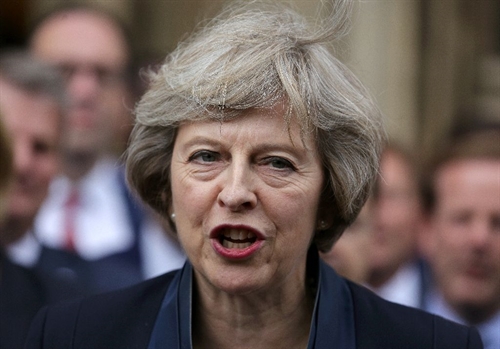 World
World

Theresa May on Wednesday will become the prime minister who leads Britain into talks to quit the European Union, after her last rival in the bid to succeed David Cameron pulled out.
 |
| Britain’s new Conservative Party leader Theresa May speaks to members of the media at The St Stephen’s entrance to the Palace of Westminster in London on Monday. -- AFP Photo |
LONDON – Theresa May on Wednesday will become the prime minister who leads Britain into talks to quit the European Union, after her last rival in the bid to succeed David Cameron pulled out.
May became the only contender after Andrea Leadsom - who had stirred a storm for suggesting she was more qualified to be premier because she had children - abruptly quit the race on Monday.
Cameron later announced May would take over from him on Wednesday, when he will to go to Queen Elizabeth II and tender his resignation after one final Prime Minister’s Questions session in parliament.
"We’ll have a new prime minister in that building behind me by Wednesday evening," he said in a statement outside 10 Downing Street.
Accompanied by her banker husband Philip and surrounded by supportive MPs, a smiling May later stressed the need "to negotiate the best deal for Britain in leaving the EU" in brief comments outside parliament.
Britain has faced the worst political turmoil in generations following June 23’s shock referendum vote to leave the European Union.
The outcome prompted Cameron to step down, plunging his ruling Conservative party into a bitter leadership race.
At the same time, the head of the main opposition Labour party, Jeremy Corbyn, is also facing a challenge to his job.
Senior MP Angela Eagle formally launched her bid on Monday, and Labour’s election coordinator, Jon Trickett, said the opposition party should brace for a general election soon after May takes office.
"I am now putting the whole of the party on a general election footing," Trickett added.
Fall of the Brexiteers
While May supported Britain staying in the EU, she cut a low profile during the referendum campaign and insists she will honour the popular vote, stressing: "Brexit means Brexit".
"There will be no attempts to remain inside the EU, there will be no attempts to rejoin it by the back door, no second referendum," she said at a leadership campaign event before Leadsom pulled out.
May wants to begin formal talks to leave the EU by the end of the year at the earliest, despite pressure from Brussels to speed things up.
The pound, which hit a 31-year low following the Brexit vote, briefly rose after Leadsom, a pro-Brexit figure with no senior ministerial experience, withdrew from contention to be prime minister.
Many British newspapers welcomed May’s coronation.
"The UK desperately needs a period of stability in which a new government led by Mrs May can devise a plan for withdrawing from the EU," the Financial Times said in an editorial.
The Guardian hailed May’s "fast track to No 10" in its front page headline.
The 59-year-old will be Britain’s second female prime minister after Margaret Thatcher, who was in office from 1979 to 1990.
May has portrayed herself as a unifying leader and tough negotiator who can stand up to Brussels in the talks over Britain’s exit from the 28-nation bloc.
All the ruling Conservative party’s top Brexit campaigners - Boris Johnson, Michael Gove and Leadsom, as well as outgoing UK Independence Party leader Nigel Farage - have now stepped back from leadership roles. – AFP




